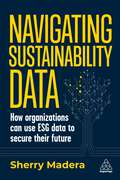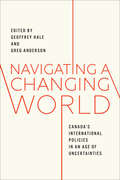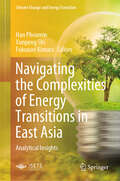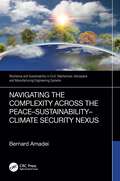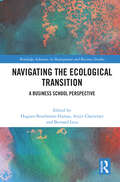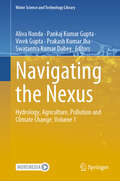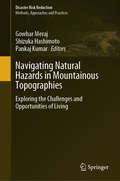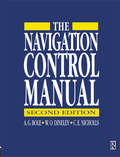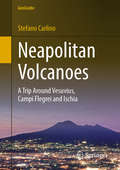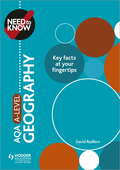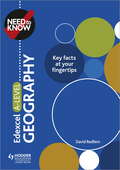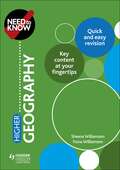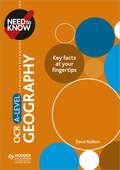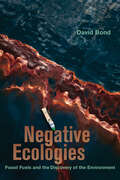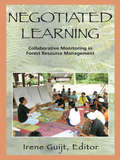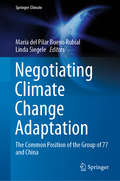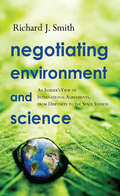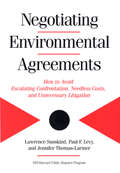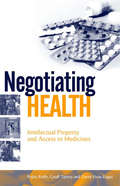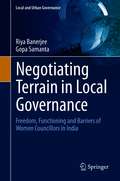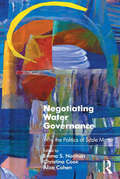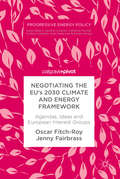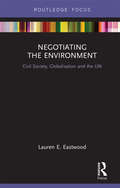- Table View
- List View
Navigating Sustainability Data: How Organizations can use ESG Data to Secure Their Future
by Sherry MaderaWith sustainability now a fundamental strategic pillar for organizations, ESG metrics are vital for decision making, yet this data is complex and ever evolving. Navigating Sustainability Data provides a focused guide for leaders and executives who want to understand how sustainability impacts a company's future and how they can use data as a key tool to facilitate growth, access to capital and meet regulatory requirements. It explores what data is required to make decisions that directly affect the company's valuation and helps leadership teams decide what data points they need to be preparing for their boards to support the organization's financial, strategic and reputational future. Showing how leaders can move from measuring data to managing future organizational risks and rewards, the book explores how to use the right data for the appropriate situation to drive efficient sustainable business decisions. It explains ESG data in plain English and highlights what data is relevant to leaders; what investors consider as essential data; and how regulation, disclosure and transparency are on a rapidly changing journey. Navigating Sustainability Data holds the information you need to avoid greenwashing, to shape your role in the sustainability landscape, and to be a leader for the future.
Navigating a Changing World: Canada's International Policies in an Age of Uncertainties
by Geoffrey Hale, Greg AndersonThe negotiation of the Canada–United StatesU.S. Free Trade Aagreement in 1985–88 initiated a period of substantially increased North American, and later, global, economic integration. However, events since the election of Donald Trump in 2016 have created the potential for major policy shifts arising from NAFTA’s renegotiation and from continuing political uncertainties in the United States and with Canada’s other major trading partners. Navigating a Changing World draws together scholars from both countries to examine Canada–U.S. policy relations, the evolution of various processes for regulating market and human movements across national borders, and the specific application of these dynamics to a cross-section of policy fields with significant implications for Canadian public policy. This bookIt explores the interaction impact of territorial institutions and extra-territorial forces – institutional, economic, and technological, among others – on interactions across national borders, both within North America and, where relevant, in broader economic relationships affecting the movement of goods, services, people, and capital. Above all, Navigating a Changing World represents the first major study to address Canada’s international policy relations within and beyond North America since the elections of Justin Trudeau in 2015 and Donald Trump in 2016 and the renegotiation of NAFTA.
Navigating the Complexities of Energy Transitions in East Asia: Analytical Insights (Climate Change and Energy Transition)
by Fukunari Kimura Xunpeng Shi Han PhouminThis book brings together a series of expert analyses to unravel the multifaceted challenges and opportunities within the energy sectors of ASEAN and East Asian countries. Distinct in its approach, this volume presents a fusion of in-depth theoretical analysis and current research, allowing readers to explore various facets of energy transitions. Contributions from leading experts on the energy implications of the Russia-Ukraine War, provide a rich, academically rigorous exploration of the subject. Designed for policymakers, researchers, academics, and professionals in the energy sector, the book maintains an advanced content level that is both intellectually stimulating and practically relevant. It is also an invaluable resource for students in higher education pursuing studies in energy policy, environmental economics, and regional studies. This book is a crucial reference for anyone seeking to deeply understand the theoretical underpinnings and future directions of energy transitions in ASEAN and East Asia.
Navigating the Complexity Across the Peace–Sustainability–Climate Security Nexus (Resilience and Sustainability in Civil, Mechanical, Aerospace and Manufacturing Engineering Systems)
by Bernard AmadeiPromoting peace and sustainability in human development while accounting for the risks associated with the impact of climate change on society has become more imperative than ever when addressing humanity's challenges of the twenty-first century. There is enough evidence that peace, sustainability, and climate security are entangled with multiple complex interactions and cannot be dealt with in isolation and independently from the environment and the numerous systems with which they interact. Yet, the intersection of peace, sustainability, and climate security or their opposites (i.e., conflict, unsustainability, and climate vulnerability) is rarely articulated with a systemic mindset. A multi-solving nexus approach is more appropriate to capture the complexity and uncertainty of how the three sectors of peace, sustainability, and climate security play a role in community development, the nature of their causal chains, and the feedback on how community development affects the three sectors. Navigating the Complexity Across the Peace–Sustainability–Climate Security Nexus explores the value proposition of using a systems approach, methodology, and tools to comprehend and model that dynamic. Features of the book: Explores the interaction between the different components of peace and the relationship between peace, sustainability, and climate security using semi-qualitative and quantitative tools; Explains how climate adaptation and mitigation are related to peace or conflict; Presents generic system dynamics modeling that can be used in different contexts.
Navigating the Ecological Transition: A Business School Perspective (Routledge Advances in Management and Business Studies)
by Bernard Leca Hugues Bouthinon-Dumas Arijit ChatterjeeThe transition towards sustainability is now a major issue that has taken centre stage in public debate, policy circles, scientific forums, and business roundtables. Higher education institutions focusing on educating tomorrow’s managers and leaders and on business practices are doubly challenged by this development. On the one hand, they must be accountable to their internal stakeholders who strongly identify with the new “environmental awakening”. On the other hand, because of their status as research institutions, they must provide answers and propose solutions to face this challenge which is shaping up to be the most crucial issue that humanity has had to face in the modern era.In this book, faculty and researchers from École Supérieure de Sciences Économiques et Commerciales (ESSEC Business School), a recognized leader among European schools of business and management, provide a multi-faceted perspective on the different areas that need to be considered to understand the new market dynamics during this environmental and social transition. The book identifies the obstacles that come in the way of the transformation of dominant business models, and how to overcome them in order to move away from “business as usual”. The various chapters in this work offer a vast diversity of approaches that address the paradigm shift towards sustainability, providing insights for both business and higher education. The book includes chapters from seven different departments at ESSEC: Management; Accounting and Management Control; Economics; Information Systems; Decision Sciences and Statistics; Marketing; Operations Management; and Public and Private Policy.Research-based and combining theory with practice, this thought-provoking book will be welcomed by academics, institutions, and professionals alike, wishing to gain perspectives on the challenges of the transition towards a sustainable society.
Navigating the Nexus: Hydrology, Agriculture, Pollution and Climate Change, Volume 1 (Water Science and Technology Library #102)
by Pankaj Kumar Gupta Swatantra Kumar Dubey Prakash Kumar Jha Aliva Nanda Vivek GuptaThis book encompasses updated information as well as future directions for researchers working in the fields of environmental science, water resource engineering, and agricultural science. Navigating the Nexus: Hydrology, Agriculture, Pollution, and Climate Change focuses on the thematic areas of water resource, agriculture, and environmental domains. This book covers advances in modelling approaches, including Machine Learning (ML)/Artificial Intelligence (AI) applications; GIS and remote sensing; and sensors; to provide hydrological, agricultural, and environmental solutions during the ongoing climate crisis.
Navigating Natural Hazards in Mountainous Topographies: Exploring the Challenges and Opportunities of Living (Disaster Risk Reduction)
by Pankaj Kumar Shizuka Hashimoto Gowhar Meraj"Nature's Fury: Navigating Natural Hazards in Mountainous Topographies" shall be a comprehensive guide to the unique challenges and hazards associated with mountainous regions, and the efforts being made to mitigate their impact. The book shall provide a detailed overview of natural hazards such as earthquakes, landslides, avalanches, and flash floods, and explores their impacts on communities and the environment. It would delve into the science of risk assessment and vulnerability analysis, and shall offer practical insights into mitigation strategies such as early warning systems, evacuation plans, and disaster response efforts. The book will also explore the role of technology and predictive modeling in mountain hazards management, and the relationship between mountain hazards and climate change. With realworld examples and case studies from the Himalayas, the Andes, and the Rockies, the book shall provide a comprehensive examination of the field of mountain hazards management. It will cover community-based disaster management and preparedness, environmental conservation and sustainable development, and the balancing of tourism and conservation in mountainous regions. The book will also include lessons learned from major mountain disasters, and the importance of international cooperation in mountain hazards management. It would cater wide audience including professionals in the field of disaster management, an environmental scientist, or even an enthusiast of mountain landscapes. We propose to have an engaging writing style and practical insights in this book, that will provide a valuable resource for anyone interested in navigating the unique challenges and hazards of mountainous topographies.
Navigation Control Manual
by A G Bole C E Nicholls W O DineleyInvaluable to participants of navigation control courses, candidates for Class 2 and Class 1 (master mariner) and all practising navigating officers.
Neapolitan Volcanoes: A Trip Around Vesuvius, Campi Flegrei and Ischia (GeoGuide)
by Stefano CarlinoThis book serves as a guide to discovering the most interesting volcano sites in Italy. Accompanied by some extraordinary contemporary images of active Neapolitan volcanoes, it explains the main volcanic processes that have been shaping the landscape of the Campania region and influencing human settlements in this area since Greek and Roman times and that have prompted leading international scientists to visit and study this natural volcanology laboratory. While volcanology is the central topic, the book also addresses other aspects related to the area’s volcanism and is divided into three sections: 1) Neapolitan volcanic activity and processes (with a general introduction to volcanology and its development around Naples together with descriptions of the landscape and the main sites worth visiting); 2) Volcanoes and their interactions with local human settlements since the Bronze Age, recent population growth and the transformation of the territory; 3) The risks posed by Neapolitan Volcanoes, their recent activity and the problem of forecasting any future eruption.
Near-Net Shape Manufacturing of Miniature Spur Gears by Wire Spark Erosion Machining
by Kapil Gupta Neelesh Kumar JainThis work describes an experimental investigation with the aim to evaluate and establish wire spark erosion machining (WSEM) as a viable alternative for high quality miniature gear manufacturing. External spur type miniature brass (ASTM 858) gears with 12 teeth, 9. 8 mm outside diameter and 5 mm face width were manufactured by WSEM. The research work was accomplished in four distinct experimental stages viz. , preliminary, pilot, main and confirmation. The aim, scope and findings of each stage are progressively presented and discussed. In essence, the investigation found that it was possible to manufacture miniature gears to high quality by using WSEM. Gears up to DIN 5 quality with a good surface finish (1. 2 µm average roughness) and satisfactory surface integrity were achieved. The results suggest that WSEM should be considered a viable alternative to conventional miniature gear manufacturing techniques and that in some instances it may even be superior. This work will prove useful to researchers and professionals in the field of miniature and micro-scale manufacturing and machining.
Need to Know: Aqa A-level Geog Epub
by David RedfernExam board: AQALevel: A-levelSubject: GeographyFirst teaching: September 2016First exams: Summer 2017 (AS); Summer 2018 (A-level)Find what you need to know, when you need it, with key facts at your fingertips for AQA A-level Geography.Keep this course companion by your side throughout your A-levels so you can check content, review your understanding, use quick tips for success and improve your exam performance.Written by an experienced teacher, author and former senior examiner, this book will help you to:- Build on your learning throughout the course by reinforcing the key facts, terms and concepts from the AQA A-level Geography specification- Answer exam questions more effectively with tips on exam technique, mistakes to avoid and important things to remember- Revise with confidence using 'Do you know?' questions at the end of each topic and more in-depth questions at the end of each sectionThis book covers the following topics:Component 1: Physical geography- Section A: Water and carbon cycles- Section B: Coastal systems and landscapes - Section C: HazardsComponent 2: Human geography- Section A: Global systems and global governance- Section B: Changing places- Section C: Contemporary urban environments
Need to Know: Edexcel A-level Geog Epub
by David RedfernExam board: EdexcelLevel: A-levelSubject: GeographyFirst teaching: September 2016First exams: Summer 2017 (AS); Summer 2018 (A-level)Find what you need to know, when you need it, with key facts at your fingertips for Edexcel A-level Geography.Keep this course companion by your side throughout your A-levels so you can check content, review your understanding, use quick tips for success and improve your exam performance.Written by an experienced teacher, author and former senior examiner, this book will help you to:- Build on your learning throughout the course by reinforcing the key facts, terms and concepts from the Edexcel A-level Geography specification- Put the content into context with synoptic links between topics and exam tips on technique, mistakes to avoid and things to remember- Revise with confidence using 'Do you know?' questions at the end of each topic and synoptic questions at the end of each sectionThis book covers the following topics:- Area of study 1, Topic 1: Tectonic Processes and Hazards- Area of study 1, Topic 2B: Coastal Landscapes and Change (Landscape Systems, Processes and Change)- Area of study 2, Topic 3: Globalisation- Area of study 2, Topic 4A: Regenerating Places (Shaping Places)- Area of study 3, Topic 5: The Water Cycle and Water Insecurity- Area of study 3, Topic 6: The Carbon Cycle and Energy Security- Area of study 4, Topic 7: Superpowers- Area of study 4, Topic 8B: Migration, Identity and Sovereignty (Global Development and Connections)
Need to Know: Higher Geography
by Sheena Williamson Fiona WilliamsonExam board: SQALevel: HigherSubject: GeographyFirst teaching: September 2018 First exams: Summer 2019 What do you really need to know for the SQA Higher Geography exam?This revision guide covers the essentials in less than 90 pages, so it's perfect for early exam preparation or last-minute revision.- Find key content at your fingertips with quick summaries of the processes, issues and terminology that you need to understand- Get a better grade in your exam with tips on exam technique, mistakes to avoid and important things to remember- Revise and practise using end-of-topic questions and synoptic questions at the end of each section - with answers provided onlineThis book covers all topics except for Energy from the Global Issues component.
Need to Know: Higher Geography
by Sheena Williamson Fiona WilliamsonExam board: SQALevel: HigherSubject: GeographyFirst teaching: September 2018 First exams: Summer 2019 What do you really need to know for the SQA Higher Geography exam?This revision guide covers the essentials in less than 90 pages, so it's perfect for early exam preparation or last-minute revision.- Find key content at your fingertips with quick summaries of the processes, issues and terminology that you need to understand- Get a better grade in your exam with tips on exam technique, mistakes to avoid and important things to remember- Revise and practise using end-of-topic questions and synoptic questions at the end of each section - with answers provided onlineThis book covers all topics except for Energy from the Global Issues component.
Need to Know: Ocr A-level Geography Epub
by David RedfernExam board: OCRLevel: A-levelSubject: GeographyFirst teaching: September 2016First exams: Summer 2017 (AS); Summer 2018 (A-level)Find what you need to know, when you need it, with key facts at your fingertips for OCR A-level Geography.Keep this course companion by your side throughout your A-levels so you can check content, review your understanding, use quick tips for success and improve your exam performance.Written by an experienced teacher, author and former senior examiner, this book will help you to:- Build on your learning throughout the course by reinforcing the key facts, terms and concepts from the OCR A-level Geography specification- Answer exam questions more effectively with tips on exam technique, mistakes to avoid and important things to remember- Revise with confidence using 'Do you know?' questions at the end of each topic and more in-depth questions at the end of each sectionThis book covers the following topics:Physical systems- Landscape Systems - Option A: Coastal Landscapes- Earth's Life Support SystemsHuman interactions- Changing Spaces; Making Places- Global Connections - Global Systems Option B: Global Migration- Global Connections - Global Governance Option D: Power and Borders Geographical debates- Disease Dilemmas- Hazardous Earth
Negative Ecologies: Fossil Fuels and the Discovery of the Environment
by David BondSo much of what we know of clean water, clean air, and now a stable climate rests on how fossil fuels first disrupted them. Negative Ecologies is a bold reappraisal of the outsized role fossil fuels have played in making the environment visible, factual, and politically operable in North America. Following stories of hydrocarbon harm that lay the groundwork for environmental science and policy, this book brings into clear focus the dialectic between the negative ecologies of fossil fuels and the ongoing discovery of the environment. Exploring iconic sites of the oil economy, ranging from leaky Caribbean refineries to deepwater oil spills, from the petrochemical fallout of plastics manufacturing to the extractive frontiers of Canada, Negative Ecologies documents the upheavals, injuries, and disasters that have long accompanied fossil fuels and the manner in which our solutions have often been less about confronting the cause than managing the effects. This history of our present promises to re-situate scholarly understandings of fossil fuels and renovate environmental critique today. David Bond challenges us to consider what forms of critical engagement may now be needed to both confront the deleterious properties of fossil fuels and envision ways of living beyond them.
Negotiated Learning: Collaborative Monitoring for Forest Resource Management
by Irene GuijtThe first book to critically examine how monitoring can be an effective tool in participatory resource management, Negotiated Learning draws on the first-hand experiences of researchers and development professionals in eleven countries in Africa, Asia, and South America. Collective monitoring shifts the emphasis of development and conservation professionals from externally defined programs to a locally relevant process. It focuses on community participation in the selection of the indicators to be monitored as well as community participation in the learning and application of knowledge from the data that is collected. As with other aspects of collaborative management, collaborative monitoring emphasizes building local capacity so that communities can gradually assume full responsibility for the management of their resources. The cases in Negotiated Learning highlight best practices, but stress that collaborative monitoring is a relatively new area of theory and practice. The cases focus on four themes: the challenge of data-driven monitoring in forest systems that supply multiple products and serve diverse functions and stakeholders; the importance of building upon existing dialogue and learning systems; the need to better understand social and political differences among local users and other stakeholders; and the need to ensure the continuing adaptiveness of monitoring systems.
Negotiating Climate Change Adaptation: The Common Position of the Group of 77 and China (Springer Climate)
by María del Pilar Bueno Rubial Linda SiegeleThis book discusses the history of the Group of 77 and China’s negotiating position on adaptation to climate change in the context of the United Nations Framework Convention on Climate Change (UNFCCC). It also addresses a number of questions that have arisen, such as: What was the process for constructing a collective position of the G77 and China on adaptation? Why is it worthwhile to negotiate in a group of such dimensions? What are the incentives for reaching the broadest common position on adaptation? What is the role of the leading coordinators, and how is this linked to the rotating annual Presidency of the G77 and China? And, how do the subgroups of the G77 participate in reaching this general position? Written by former and current adaptation negotiators from developing countries, the book offers various perspectives from the subgroups and leading coordinators of the G77 and China as well as other organizations. Furthermore, in contrast to previous analyses on climate change negotiations, which focus mainly on the behaviour or position of one group, it presents a unique approach based on the strength of collectivism in the G77 and China. The book appeals to practitioners and professionals as well as scientists in climate change management and policy, impacts and adaptation, international relations, as well as diplomacy and development.
Negotiating Environment and Science: An Insider's View of International Agreements, from Driftnets to the Space Station
by Richard J. SmithIn this thought-provoking new book, career U.S. State Department negotiator Richard J. Smith offers readers unprecedented access to the details about some of the most complex and politically charged international agreements of the late and immediate post Cold War era. During his nine years as Principal Deputy Assistant Secretary in the Bureau of Oceans and International Environmental and Scientific Affairs, Smith led U.S. negotiations on many significant international agreements. In Negotiating Environment and Science, Smith presents first-hand, in-depth accounts of eight of the most high-profile negotiations in which he was directly involved. The negotiations Smith covers are wide-ranging and include the London agreement to amend the Montreal Protocol on Substances that Deplete the Ozone Layer, the international space station agreement, the U.S.-Soviet (eventually, U.S.-Russian) agreement on scientific cooperation, the U.S.-Canada acid rain agreement, the negotiations in Sofia, Bulgaria that established a first link between human rights and the environment, and a contentious confrontation with Japan over driftnet fishing. Smith chronicles the development of these negotiations, the challenges that emerged (as much within the U.S. delegations as with the foreign partners), and the strategies that led to substantive treaties. Smith infuses his narrative with unique historical insight as well as astute observations that can guide U.S. strategies toward productive international agreements in the future. His book also highlights the shift in diplomatic focus over the past 25 years from arms control and other security-related agreements to international and trans-boundary agreements that address global environmental threats and promote cooperative approaches in science and technology. Written for an audience with a general interest in environmental issues as well as international relations, Negotiating Environment and Science will also be an important resource for historians, political scientists, and students in international law and diplomacy.
Negotiating Environmental Agreements: How To Avoid Escalating Confrontation Needless Costs And Unnecessary Litigation
by Paul Levy Lawrence Susskind Jennifer Thomas-LarmerWhen business leaders, government officials, and other stakeholders come to the table in an environmental, health, or safety dispute, acrimony often results, leading to expensive and time-consuming litigation. Not only does this waste precious resources, but rarely does the process produce the best outcome for any of the parties involved.For the past five years, the authors of this volume have conducted semi-annual seminars at the MIT and at Harvard to provide business leaders and regulators with the knowledge and skills they need to more effectively handle environmental, health, and safety negotiations. Their strategy, known as the "mutual gains approach," is a proven method of producing fairer, more efficient, more stable, and wiser results. Negotiating Environmental Agreements provides the first comprehensive introduction to this widely practiced and highly effective approach to environmental regulation.The book begins with an overview of the mutual gains approach, introducing important concepts and ideas from negotiation theory as well as the theory and practice of mediation. The authors then offer five model negotiations from their MIT-Harvard Public Disputes seminar, followed by a series of real-world negotiated environmental agreements that illustrate the kinds of outcomes possible when the mutual gains approach is employed. A collection of writings by leading experts provide valuable insights into the process, and appendixes offer both instructions for conducting model negotiation sessions and analysis of actual game results from earlier seminars.This is the only prescriptive text available for the many regulatees and regulators involved in environmental regulatory negotiations each year. Anyone involved with environmental negotiation -- including corporate and public sector managers, students of environmental policy, environmental management, and business management -- will find the book an essential resource.
Negotiating Health: Intellectual Property and Access to Medicines
by Pedro Roffe Geoff Tansey David Vivas-EuguiIn developing countries, access to affordable medicines for the treatment of diseases such as AIDS and malaria remains a matter of life or death. In Africa, for instance, more than one million children die each year from malaria alone, a figure which could soon be far higher with the extension of patent rules for pharmaceuticals. Previously, access to essential medicines was made possible by the supply of much cheaper generics, manufactured largely by India; from 2005, however, the availability of these drugs is threatened as new WTO rules take effect. Halting the spread of malaria and HIV/AIDS is one of the eight Millennium Goals adopted at the UN Millennium Summit, which makes this a timely and topical book. Informed analysis is provided by internationally renowned contributors who look at the post-2005 world and discuss how action may be taken to ensure that intellectual property regimes are interpreted and implemented in a manner supportive to the right to protect public health and, in particular, to promote access to medicines for all.
Negotiating Terrain in Local Governance: Freedom, Functioning and Barriers of Women Councillors in India (Local and Urban Governance)
by Gopa Samanta Riya BanerjeeThis book explores and analyses women’s participation in local urban governance in West Bengal, India. It is developed from empirical research with in-depth understanding of ground situations of freedom, functioning and obstacles of women councilors in India. The central idea of this book revolves around two central research questions: 1. How are women’s positions and spaces changing due to their political participation in the urban local governance? and 2. What are the major hurdles they face in their day to day lives barring their emancipation? The main strength of the book lies in the in-depth grounded research in four small cities (Darjiling, Balurghat, Raniganj and Hugli-Chinsurah) using both quantitative and qualitative research methods. This volume can be considered as a reference book for Gender Studies, Women’s Studies, Urban Governance, Women and Policy Research, Gender Development Studies.
Negotiating Water Governance: Why the Politics of Scale Matter (Routledge Studies in Environmental Policy and Practice)
by Emma S. Norman Christina CookThose who control water, hold power. Complicating matters, water is a flow resource; constantly changing states between liquid, solid, and gas, being incorporated into living and non-living things and crossing boundaries of all kinds. As a result, water governance has much to do with the question of boundaries and scale: who is in and who is out of decision-making structures? Which of the many boundaries that water crosses should be used for decision-making related to its governance? Recently, efforts to understand the relationship between water and political boundaries have come to the fore of water governance debates: how and why does water governance fragment across sectors and governmental departments? How can we govern shared waters more effectively? How do politics and power play out in water governance? This book brings together and connects the work of scholars to engage with such questions. The introduction of scalar debates into water governance discussions is a significant advancement of both governance studies and scalar theory: decision-making with respect to water is often, implicitly, a decision about scale and its related politics. When water managers or scholars explore municipal water service delivery systems, argue that integrated approaches to salmon stewardship are critical to their survival, query the damming of a river to provide power to another region and investigate access to potable water - they are deliberating the politics of scale. Accessible, engaging, and informative, the volume offers an overview and advancement of both scalar and governance studies while examining practical solutions to the challenges of water governance.
Negotiating the EU’s 2030 Climate and Energy Framework: Agendas, Ideas And European Interest Groups (Progressive Energy Policy Ser.)
by Oscar Fitch-Roy Jenny FairbrassIn 2014, European heads of state selected new targets for the EU as part of the 2030 climate and energy framework. These targets will guide the ambition and nature of EU policy in this area until 2030 and are likely to have important implications for Europe’s transition to a low-carbon economy. This book exposes the role of civil society and business interest groups in setting the policymaking agenda and defining the range of options for the framework. Based on a unique sample of 32 in-depth interviews with Brussels policy elites, this book casts EU interest representation in a new light. In a novel application of the ‘multiple streams approach’, sequential chapters present the problems faced by policymakers, the range of policy options available to address them and the political constraints within which policy entrepreneurs attempted to attached policies to problems.
Negotiating the Environment: Civil Society, Globalisation and the UN (Routledge Focus on Environment and Sustainability)
by Lauren E EastwoodCivil society participants have voiced concerns that the environmental problems that were the subject of multilateral environmental agreements negotiated during the 1992 Rio processes are not serving to ameliorate global environmental problems. These concerns raise significant questions regarding the utility of negotiating agreements through the UN. This book elucidates the complexity of how participants engage in these negotiations through the various processes that take place under the auspices of the UN—primarily those related to climate and biological diversity. By taking an ethnographic approach and providing concrete examples of how it is that civil society participants engage in making policy, this book develops a robust sense of the implications of the current terrain of policy-making—both for the environment, and for the continued participation of non-state actors in multilateral environmental governance. Using data gathered at actual negotiations, the book develops concepts such as participation and governance beyond theory. The research uses participant observation ethnographic methods to tie the theoretical frameworks to people’s actual activities as policy is generated and contested. Whereas topics associated with global environmental governance are traditionally addressed in fields such as international relations and political science, this book contributes to developing a richer understanding of the theories using a sociological framework, tying individual activities into larger social relations and shedding light on critical questions associated with transnational civil society and global politics.
